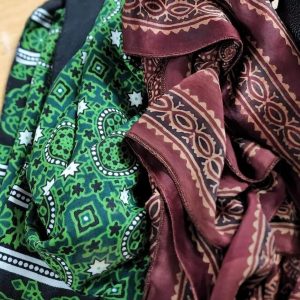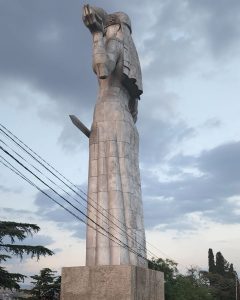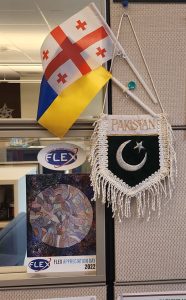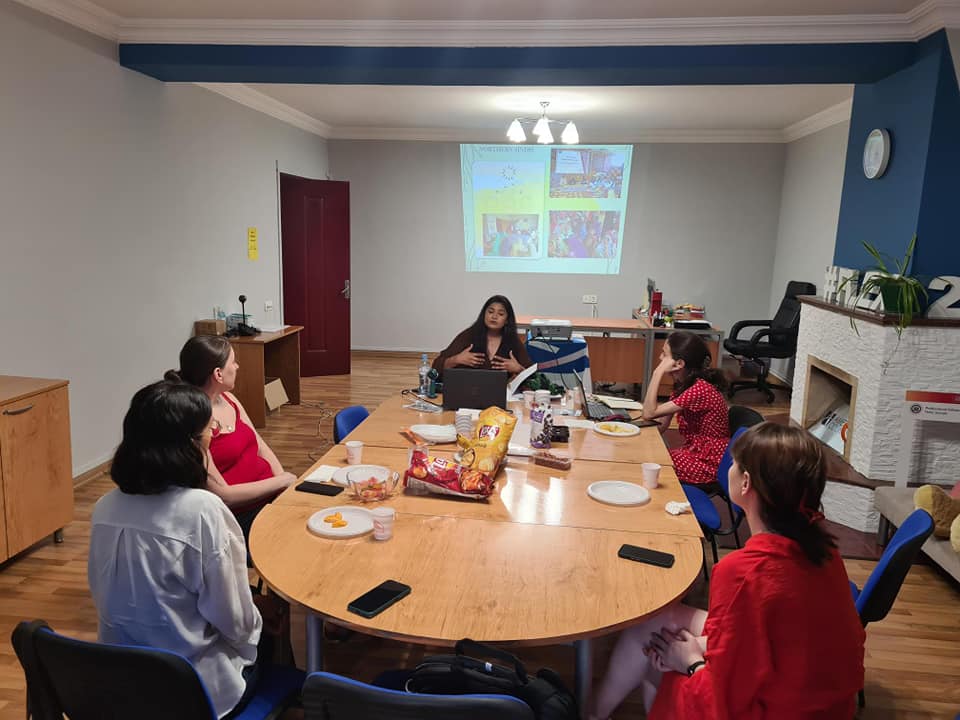
On August 8, 2022, I had an opportunity to participate in a hybrid event conducted by the American Councils for International Education (American Councils), Future Leaders Exchange (FLEX) program. It was a “Suitcase Stories” session, an event designed for alumni of the FLEX Program. The American Councils FLEX program is a well-known, competitive U.S. State Department-sponsored program that brings high school students from 21 countries to spend one academic year attending American high schools and living with volunteer host families. The underlying objective is to promote mutual understanding between American citizens and those from the 21 countries in Europe, Eurasia, and Central Asia, which includes Georgia.

The “Suitcase Stories” is a ‘long-standing tradition’ at American Councils – Georgia Office, which officially began in 2013, specifically for the Georgian FLEX Alumni Community. Mariam Oniani, the American Councils FLEX Alumni Coordinator organized this session. The tradition brings in guest speakers, who have interesting, creative, and motivating stories of cross-cultural personal and professional experiences traveling around the world. I was honored to have the opportunity to share some stories from my graduate-level academic fieldwork and cultural immersion in Pakistan, and for the Georgian FLEX Alumni community in Tbilisi, Georgia.

This session took place one week prior to the 75th Anniversary of Pakistan and India’s Independence (Azaadi), a special year commemorating the historic Partition of India. I shared my personal and professional journey in higher education, specifically some stories, observations, and lessons from my Fieldwork in Pakistan.
The two themes that I noted in the session through stories of my immersion and through my personal and professional journey of navigating both my Masters and Doctoral Fieldwork in Pakistan, were “empowerment” and “hospitality.” I shared stories from my time working at the All Pakistan Women’s Association (APWA) in Karachi, while conducting research on violence against women for my Masters thesis, and interviewing women in both urban and rural settings. I also shared a story from my time at the Human Rights Commission of Pakistan (HRCP) in Karachi, as well as my experience navigating Fieldwork in Pakistan during my doctoral studies on the topic of foreign aid effectiveness, namely the adventures of traveling to various cities around the country, accessing rural settings, and engaging with women leaders in community-based organizations of poverty alleviation programs.

In one of my stories, I mentioned being introduced to the “Diplomacy of Laughter” through the fieldwork, and how laughter became a tool for diplomacy in certain situations when engaging with locals, as many would find my attempts to speak in Urdu or learn Sindhi or Pashto, humorous. I also noted the vibrancy and diversity of Pakistan, how traveling from one city/district to another would often feel like I was traveling into a completely different country.
During the talk, I provided a slideshow of a small collection of photos from my fieldwork in Pakistan. Some pictures can be found here in this page on my website. {These photos are mostly from my first field trip for my doctoral fieldwork. I plan to update that page with more photos with my longer field assessment in the near future}.

At the event I also brought the Ajrak shawls, originally from rural Sindh, Pakistan, and demonstrated the ceremonial tradition of placing the Ajrak around the neck or on the shoulders of the guest, which was a symbol of “memaan nawazi” (welcoming and hospitality), something I received in Sindh and all around Pakistan (in different ways) during my fieldwork.

After my remarks, I answered questions from the attendees relevant to my research and travels in Pakistan. I was very impressed with the exchange and the excellent questions from the participants, specific to the research as well as the Pakistani culture, including the 4-day wedding celebrations, the cultural dress worn by women, alongside questions about specific stories I learned from my encounter with women community members and leaders in rural Sindh.

At the end of the session, I noted that my Masters and Doctoral fieldwork became connected, specifically on the notion of female empowerment. The experience went full circle for me, from interviewing rape and trafficking victims while working at APWA and HRCP during my Masters, to hearing the voices of rural women, with incredible mind-blowing confidence through the social mobilization efforts in action, when engaging the empowered village women in Northern Sindh, during the doctorate.
It was a special element of exchange between two vastly diverse cultures, and the connections made between the two, which were invaluable for me.
I found this experience to be very important and symbolic for the purpose of the session, contributing to the mission of promoting mutual understanding through academic exchange and cultural immersion, and in lieu of the current events in Pakistan especially with the objective to educate about what I have learned about the culture through my travels abroad and academic endeavors. I felt it was important to share that my international travels began with family trips to Pakistan from America and from a young age, being born and raised in America. It was those trips that sparked a curiosity for a world beyond my family visitations, and beyond the borders of neighborhoods inhabited by my extended family in Karachi, Pakistan, and the immense desire and yearning to learn and know more about the country. I felt this context to be especially important with my quest to bridge understanding of a very diverse and complex country.
It was truly a humbling and heartwarming moment.

Through supporting the American Councils FLEX program, I had the opportunity to spend a week in Tiblisi, Georgia as well. During the talk, I noted a few synergies between my time in Pakistan, and Georgia with my time immersing there the days prior. Aside from the Suitcase Stories session, I had the opportunity to see the field office operations and some activities conducted by American Councils in Georgia. The purpose of my visit was to learn about the field operations on a country of critical strategic importance, meet the American Councils Georgia field staff, and also serve as a Flight Leader for FLEX to bring back two exchange students from Georgia. Through this experience from American Councils, I had the beautiful opportunity to visit a country I never visited before and a country I never thought I would visit anytime soon. It was a very rewarding experience overall.

Additionally, I was provided a tour by one of the FLEX Alumni, Dali Tsakadze! One of my favorite sights in Georgia was the Mother of Georgia (featured in the photo above). Learning about the Mother of Georgia was also symbolic, because it addressed the two themes I shared during the Suitcase Stories session. The Mother of Georgia is a monument of a woman holding a sword/weapon in her right hand: which symbolized the fight for freedom (“azaadi”) (which I believe relates to the notion of seeking empowerment) and a cup of red wine in the other, to symbolize hospitality (“memaan nawaazi”). These were the themes discussed in the session, in the context of Pakistan, what I experienced during my fieldwork in Pakistan, and also what I experienced during my time in Georgia.
At the closing remarks of my talk, I informed the attendees that the first phrase I learned in Pashto in my first encounter with Khyber Pakhtunkhwa during my Pakistan Fieldwork, was “Dera Dera Manana”, which means thank you very much. And the first word that I learned in Georgian was “Madluba.” Which means thank you. I thought that additional “synchronicity” was special among the other connections I made about my brief time in Georgia to that of my fieldwork in Pakistan.

Further, there was this concept adopted by the Rural Support Programs Network in Pakistan, that many of the leaders of the program would share with me throughout my Fieldwork: “seeing is believing.” It applied to the concept of how community members would participate in the community activities and meetings facilitated by the poverty alleviation programs, when they would witness the success of the program activities in other communities. But it is also why so many of my contacts working on the Pakistan RSPs wanted me to be out in the rural communities to see the success for myself, particularly the self-help initiatives in action, the confidence-building indicators and empowerment evident among rural women. I remembered this now, within the same context in serving for this American Councils administered FLEX program, ultimately seeing the value of the academic exchange and being a part of the organization in their incredible efforts in providing life-changing experiences for amazing young people around the world.
I was indeed reminded of the generosity I received all around Pakistan for my research informants to have opened up their homes, communities, offices, and hearts to me, while I learned from their stories and experiences. I was reminded again, after experiencing the same kind of generosity in Georgia.
At the end of the presentation, I shared the quote from The Mahatma that carried me throughout my higher education efforts and which I have shared in previous posts and even noted in my Dissertation Acknowledgements:
“All your scholarship would be in vain if at the same time you do not build your character and attain mastery over your thoughts and your actions.” – Mahatma Gandhi
Thank you for reading and please stay tuned for more articles and insights from my research, fieldwork, and travels in the coming months! And thank you American Councils – Georgia, FLEX family, and Georgia in general, for the “memaan nawaazi” that you shared with me on this memorable trip!

ACKNOWLEDGEMENTS at American Councils, Georgia
I would first and especially like to thank Mariam Oniani, FLEX Alumni coordinator for organizing this valuable exchange. And thank you to all the participants online and offline, including Susana Patsatsia, Rima Beridzi, and others (please forgive me for missing names). Also for my time with American Councils Office in Georgia, I would like to thank Dr. Timothy Blauvelt for his generous support and time, Dali Tsakadze, Anjela Pakihlajian, Dodo Gotsiridze, Tamar Geguchadze, Aleksandre Gulbiani, and anyone else I may have missed! I also had the opportunity, as the primary objective for my travels, to bring back exchange students from Georgia, Ana Japaridze and Barbare Aliashvili, as part of the FLEX exchange program noted above. Both are extraordinary and wonderful students, and I remain with gratitude to have learned from you as well as my other colleagues about the Georgian language, cuisine, culture, history and traditions. I hope to continue to stay connected!

The Partition was a monumental moment in history for the Indo-Subcontinent. Many of our ancestors have incredible stories of migrating from India to the newly created state of Pakistan, and what is now Pakistan to India. I am currently a member of the American Pakistan Foundation (AFP), National Leadership Council. In honor of “Pakistan at 75,” APF recently completed a great webinar with the Citizens Archive of Pakistan, a non-profit organization that works for the cultural and historical preservation of Pakistan, which they share stories from the earlier days of Pakistan’s independence. The webinar can be accessed here: https://www.youtube.com/watch?v=YvnQy41JyHY

Link to the American Councils for International Education: https://www.americancouncils.org/
American Councils Donation Page: https://www.americancouncils.org/philanthropic-initiatives
Link to the American Pakistan Foundation: https://www.americanpakistan.org/
APF Donation Page: https://americanpakistanfoundation.givingfuel.com/donations
Link to the Citizens Archive of Pakistan: citizensarchive.org




